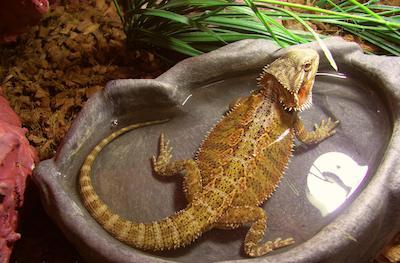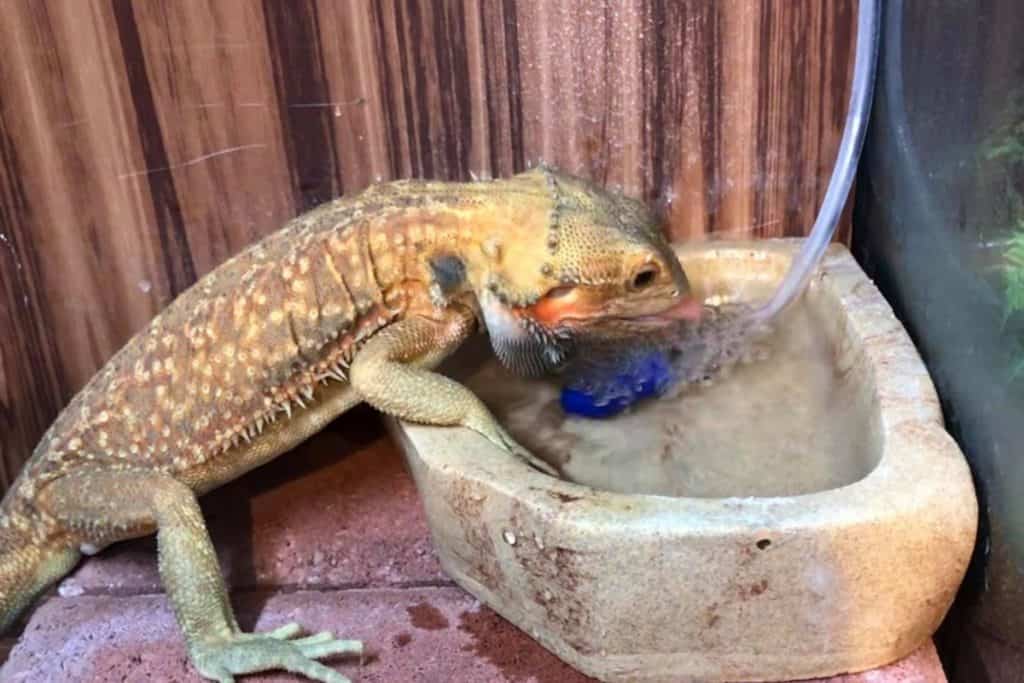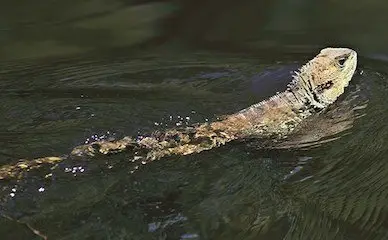When a bearded dragon accidentally swallows water, it’s called “aspirated water.” Aspirated water can make them very sick and even put their life at risk. So, if your bearded dragon ingests water by mistake, it’s important to act quickly. Here’s what you can do:
First, remove any extra water from their habitat to prevent them from drinking more. Next, keep a close eye on their behavior and breathing. If they seem distressed, have trouble breathing, or act strangely, make sure their habitat is comfortable and stress-free. Stress can make their condition worse, so creating a calm environment is really important.
This post will discuss the symptoms of aspirated water in bearded dragons, the hazards involved, and preventative measures.
What Is Water Aspiration in Bearded Dragons?
Bearded dragons sometimes breathe in water by accident, which can make them unwell. This is called water aspiration, and it can lead to a lung infection called aspiration pneumonia. When they drink or take a bath, water might go into their lungs instead of their tummy.
This can make it tough for them to breathe and create big issues. It’s crucial to understand how this happens and how it impacts bearded dragons’ delicate breathing system so we can take better care of them.
How to Recognize and Address Aspiration in Bearded Dragons?
It’s really important to notice if bearded dragons are having trouble breathing in water early on. Some signs to watch for are constant coughing, weird noises when they breathe like wheezing or crackling, or if they’re breathing fast or slow. They might also seem super tired, have stuff coming out of their nose, breathe with their mouth open, or not feel like eating.
Also, keep an eye out for any changes in their behavior, like being more restless or not moving around much. These signs could mean they’re struggling to breathe. Recognizing these signs helps us spot the problem quickly and take action before it gets worse.
How to Provide First Aid and Treatment for Aspiration in Bearded Dragons?

Providing first aid and treatment for aspiration in bearded dragons can be challenging and requires prompt action. Aspiration occurs when a bearded dragon inhales fluids, which can lead to respiratory distress and infection.
Immediate actions in case of aspiration
When a bearded dragon accidentally breathes in water, quick actions are super important to keep them safe and healthy.
First, take out any water in their home right away to stop them from drinking more. Make sure their home stays warm and calm to help them relax and breathe better.
Try not to handle the bearded dragon too much to avoid stressing them out, and don’t give them any medicine unless a vet says so.
In addition, keep a close eye on them for any behavior changes or breathing problems, and be gentle with them to help them feel better.
Veterinary treatment options
When a bearded dragon accidentally breathes in water, quick actions are super important to keep them safe and healthy. First, take out any water in their home right away to stop them from drinking more. Make sure their home stays warm and calm to help them relax and breathe better.
Try not to handle the bearded dragon too much to avoid stressing them out, and don’t give them any medicine unless a vet says so. Keep a close eye on them for any behavior changes or breathing problems, and be gentle with them to help them feel better.
Recovery and rehabilitation
Helping a bearded dragon recover from breathing in water means making sure they have a good place to get better. Keep the air just right, give them good food, and keep their home calm. Check how they’re breathing, acting, and eating to see how they’re doing.
After they get better, it’s important to keep an eye on them with more vet visits to make sure they stay healthy and don’t have breathing problems again. This helps them stay happy and healthy for a long time..
How to Ensure Proper Hydration Techniques for Bearded Dragons?

Maintaining the right level of hydration is vital for the health of your bearded dragon. And there are several key techniques to ensure they stay properly hydrated.
Proper hydration techniques for bearded dragons
Making sure bearded dragons stay hydrated means giving them water in different ways, like with water dishes, spraying water, or giving them veggies with lots of water. Keep an eye on how much water they drink and help them drink regularly, especially when it’s hot or after they eat.
Also, remember that each bearded dragon is different, so their water needs might vary based on things like how old they are, how big they are, and how healthy they are.
Having a good plan to keep them hydrated is really important to make sure they don’t accidentally breathe in water.
Types of water sources and their safety
It’s important to provide bearded dragons with water in a safe way to avoid them breathing in water and getting sick. To allow them to drink without having their heads buried, use shallow water dishes.
Additionally, ensure the water is pure by using dechlorinated or filtered water to get rid of any impurities that might be harmful. Wash their water bowls on a regular basis to prevent germs from accumulating and rendering the water unhealthy for consumption.
Safe handling of water dishes
Minimizing the danger of water aspiration in bearded dragons is mostly dependent on proper handling practices while handling water dishes. To minimize the risk of unintentional ingestion or inhalation when drinking, owners should often check and modify the level of the water dish. The bearded dragon will have safer and more comfortable access to water if the water dish is placed in a stable and accessible area of the cage.
Additionally, incorporating appropriate water dish designs that prevent submersion and facilitate easy drinking is essential for promoting safe hydration practices and mitigating the risk of aspiration.
FAQs
These are responses to some of the frequently asked questions.
Yes, they can. Bearded dragons might accidentally inhale water while drinking or bathing, leading to aspiration pneumonia.
Throwing up water could be a sign of overdrinking, stress, or an underlying health issue, so it’s important to monitor their behavior and consult a veterinarian if it persists.
Yes, they can absorb a small amount of water through their vent, which is helpful in staying hydrated, especially in arid environments.
Signs of water aspiration include coughing, wheezing, abnormal breathing patterns, lethargy, nasal discharge, open-mouth breathing, and a lack of appetite.
Coughing after drinking water could indicate water aspiration, where water enters the respiratory system instead of the digestive system, causing irritation and inflammation.
If your bearded dragon is choking, it might show signs such as excessive drooling, pawing at the mouth, gagging, or difficulty breathing. Immediate veterinary attention is necessary in such cases.
Final Words
Taking good care of bearded dragons means making sure they drink well and breathe easily. Knowing about the dangers of water problems and stopping them before they happen can keep these pets safe.
Also, giving them a comfy home and healthy meals can help them get better and stay strong for a long time. Just remember to always think about what these reptiles need to be happy and healthy!

